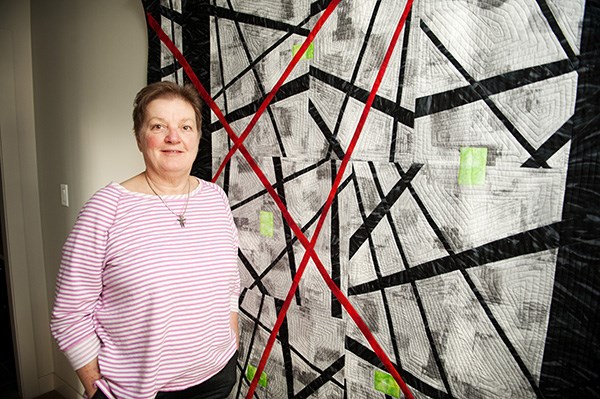trapped
images of death
shadows of darkness and helplessness
back drop of vigilance and depression
shards of secrecy and distrust
slashes of trauma, pain, fear and anger
a maze of blame, shame and sadness
bits of hope, shattered
tension of impending grief
framed by depression
Squamish quilter Lin Taylor stitched the above poem, titled ‚ÄúIn the Realm of Hungry Ghosts: loving an addict,‚Äù onto a quilt that explores her experiences with a close friend‚Äôs struggle with addiction.¬Ý
The abstract piece is in honour of Dr. Gabor Mat√©, who is known for his work on the Downtown Eastside with patients challenged by hard drug addiction and mental illness.¬Ý
Taking dozens of hours to complete, Taylor carefully chose each colour to represent her heavy emotions.¬Ý
Grey, for instance, signifies the deep shadows of addiction, while red represents the slashes of trauma, pain, fear and anger she writes about in the poem. Green indicates hope.¬Ý
Each block is intricately stitched into a maze like the daily path an addict endures.¬Ý
‚ÄúI saw a scene of desperation and patterns in how I experienced my friend‚Äôs addiction,‚Äù Taylor, who is also a psychologist, said from her home studio in Squamish.¬Ý
She has presented the quilt at conferences on addiction, including one that focused on the effects of fetal alcohol syndrome.¬Ý
Fifteen years ago, Taylor joined a friend at a quilting class just for fun, but then went on to teach herself the craft after realizing it was the perfect outlet for her energy.¬Ý
“I never thought of myself as particularly creative or artistic. I wanted something to captivate me, and I didn’t think it would be sewing,” said Taylor, who now displays many of the quilts – which she describes as “art quilts that have meaning” – on the walls of her house.
“I didn’t know the rules, so I did what I felt.”
Originally from Edmonton, she now works with residential school survivors in –°¿∂ ”∆µ and is in the middle of creating a quilt that is based on their experiences ‚Äì both past and present ‚Äì and her understanding of their stories. Using a sewing machine, she is preparing to stitch the pieces of fabric now that the initial design is complete.¬Ý
‚ÄúIn some ways, it‚Äôs easier to express this kind of story through abstract,‚Äù said Taylor, who rarely sells her quilts. She plans to present this quilt at conferences once it‚Äôs complete. ¬Ý
Her quilts are labours of love that take between 50 and 200 hours to complete. On one quilt, Taylor sewed 91 pieces of fabric in a four-by-four inch block. Others are relatively simple, such as ‚Äúwhole cloth‚Äù quilts that incorporate a design stitched onto one large piece of fabric.¬Ý
Taylor delves into tough topics but also creates lighthearted quilts, including a t-shirt quilt titled ‚ÄúCelebrating an Athlete,‚Äù a tribute to her son‚Äôs basketball career in high school and university.¬Ý
She has also sewn quilts using a vivid array of colours to create designs of flowers and abstract blocks, as well as houses and trees in a circular quilt called ‚ÄúIt‚Äôs a Small World.‚Äù Another quilt was made from elementary students‚Äô artwork as a present for their teacher who was retiring.¬Ý
Along with other members of the Squamish Quilters‚Äô Guild, Taylor is sewing quilts for the Syrian refugees that will soon be arriving to live in Squamish. The guild has a stockpile of quilts made from simple patterns that they donate to people in need of warmth, whether they are sick or had a new baby. The quilts for the refugees are described as ‚Äúfunctional‚Äù and meant to be used in beds and cribs.¬Ý
“When making a quilt, every piece of fabric is used. I like that,” said Taylor.
For those who do sell quilts, it‚Äôs rare for a quilter to recuperate the time spent on the project, she added.¬Ý
‚ÄúThey are priceless gifts and labours of love that symbolize warmth and generosity.‚Äù¬Ý




